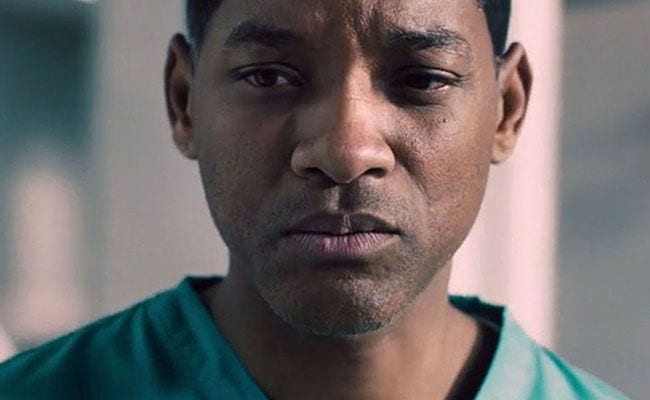
“You should see this, Bennet. It’s actually really beautiful.” Watching football on television, Prema (Gugu Mbatha-Raw) calls to Bennet Omalu (Will Smith). “It’s a game of awareness,” says a coach on screen, “A game of desire.” Bennet, a forensic pathologist who’s researching the effects of that very sport on its players, sits on the couch beside Prema, his wife to be. He carries with him a jar filled with fluid and a small object. Look at this, he says, to you as much as to her. “The human brain sits in a fluid,” he says, shaking the jar so the brain inside smacks alarmingly against the glass. Hits in the game, he goes on, present a “huge risk”.
Contrived and dramatic, this moment is typical of Concussion‘s tendency to overstatement. Ironically but not surprisingly, such overstatement undercuts its contention that Omalu’s diagnosis that US football players were suffering chronic traumatic encephalopathy (CTE) and moreover, that the NFL knew about the “concussion crisis for years” and covered it up. While it’s surely distressing to watch former players like Mike Webster (David Morse) struggle with the effects of CTE, it’s also distracting to see vague assertions that the NFL’s nefarious tactics bring on a miscarriage.
The film, based on Jeanne Marie Laskas’ 2009 GQ article, is more convincing as it keeps focused on the Nigerian-born Omalu’s determination, in particular in the face of accusations that he can’t understand the game because he’s a foreigner (“You’re not American, you’re not even African American”) or that he’s incompetent as well as a foreigner (“Take your bullshit science and go back to Africa”). As Omalu maintains a quiet confidence, these rages against him appear increasingly hysterical, and so, by the way, carry an added weight as the movie’s released to theaters in late 2015, during this ongoing season of US anti-other fear and fury.
Concussion reinforces its case against the NFL by aligning Omalu with a couple of through-and-through Americans, former Steelers physician Julian Bailes (Alec Baldwin) (“You’re in trouble,” he instructs Omalu, “But you’re not wrong”) and his own boss down at the Allegheny County Coroner’s Office, Cyril Wecht (Albert Brooks). Dr. Wecht’s dark wit is especially welcome, as he provides what amounts to a running commentary on the otherwise stern plot, from his much-replayed-in-promos observation that the NFL “owns a day of the week” to his response when other scientists — some members of the NFL’s own Mild Traumatic Brain Injury Committee — publicly challenge Omalu’s findings, published in Neurosurgery in 2005 (“Apparently the NFL owns neuroscience”).
By the time the FBI decides to arrest Wecht on 84 separate counts, you get the idea that the NFL has friends everywhere. The film includes as well a brief note on the infamous 2007 NFL meeting in Chicago, called by then new commissioner Roger Goodell (Luke Wilson). Promised a chance to present his findings, Omalu is summarily denied that chance when he arrives on site, at which point Bailes promises to do right by his new friend, only to emerge from the closed-door meeting with the news that the NFL doesn’t care.
This is the upshot of Concussion. And even if you wish it was a better movie, this upshot is worth noting, that for all the new safety protocols and improved equipment, the NFL remains almost pathologically unconcerned about its players and focused on its own marketing and earnings. Back in November, rumors circulated that ESPN, so profoundly and complicatedly in league with the League, might not run ads, leading to speculations of how damning it might be to see games where commercial breaks for injuries might lead directly to images from Concussion. Plainly, ESPN decided against this tack.
It may be that ESPN is defying NFL pressure, but it’s just as likely that the NFL still doesn’t care. Holding to its longstanding short-term view of the universe, the League can remain its arrogance, can withstand charges that even if it once deceived its players, their families, and fans, now it’s playing fair. It may also be that the NFL is so sure of its possessive and profitable powers — owning Sunday as well as neuroscience — that it can hold out against those few light bulbs that might go off for viewers of the film.
This is to say that while Will Smith is a worldwide draw, it’s likely that most of those viewers will know something about football and will have heard of “the controversy”, and won’t be surprised by what they see here. The key, as Bailes notes here, repeating what many observers have said, is future players, whether they or their families will ever reject the game. With recurring stories of sensational hits and failed protocols — Odell Beckham Jr. or Case Keenum — you’d think someone outside the NFL might take legal or political action. If, thus far, the League’s promotional powers have proved resilient and irresistible, it may be that a cultural shift must come from elsewhere.
Certainly, no one movie can do all that work. This step toward increased visibility is an important step, following the efforts of Omalu and other researchers like Ann McKee or Robert Cantu, as well as activists like Chris Nowinski and increasing numbers of players and their families. Football can be beautiful, but it can also be dangerous. Both can be true as well as visible.


![Call for Papers: All Things Reconsidered [MUSIC] May-August 2024](https://www.popmatters.com/wp-content/uploads/2024/04/all-things-reconsidered-call-music-may-2024-720x380.jpg)



